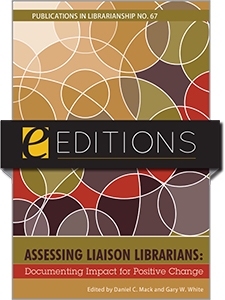
Assessing Liaison Librarians: Documenting Impact for Positive Change (PIL #67)—eEditions e-book
The download link for this product can be found on the final confirmation screen after you complete your purchase, and may also be accessed from your Account Profile. For more information about ALA eEditions file types and how to view them on eReaders, desktop computers, and other devices, see this page.
Primary tabs
You don't need to be an ALA Member to purchase from the ALA Store, but you'll be asked to create an online account/profile during checkout to proceed. This Web Account is for both Members and non-Members. Note that your ALA Member discount will be applied at the final step of the checkout process.
If you are Tax-Exempt, please verify that your account is currently set up as exempt before placing your order, as our new fulfillment center will need current documentation. Learn how to verify here.
- Description
- Table of Contents
- About the authors
- Reviews
Assessment is increasingly important to higher education. Tight budgets and scarce resources demand accountability from the entire academy, including the library. Librarians must be prepared to document the impact of the programs they create, the collections they develop, and the services they offer. Liaison librarians in academic libraries focus on engagement with academic units and outreach to students, faculty, and the community of scholars.
In a series of scholarly essays, Assessing Liaison Librarians: Documenting Impact for Positive Change, examines how academic libraries assess liaison activities and offers recommendations for documenting the impact of programs and services. Individual chapters address liaison activities relating to collection development; library instruction; research services; engagement and outreach; online, blended and other learning environments, including MOOCs; scholarly communications and information technology; the importance of assessment in the 21st century research library; and professional development of liaisons librarians.
Assessing Liaison Librarians: Documenting Impact for Positive Change is appropriate for all types of academic libraries as well as for schools of library and information science.
Introduction: Libraries and Assessment
Daniel C. Mack and Gary W. White, Ph.D.
Chapter One: The Place of Liaisons and the Central Role of Assessment in American Higher Education
Gary W. White, Ph.D.
Chapter Two
Programmatic Assessment of Research Services: Informing the Evolution of an Engaged Liaison Librarian Model
Sarah Anne Murphy and Craig Gibson
Chapter Three: Assessment of Teaching, Learning, and Literacies
Ellysa Stern Cahoy
Chapter Four: Library Assessment for Online, Blended, and Other Learning Environments
Maria R. Barefoot, MLIS, AHIP
Chapter Five: Beyond the Bibliographer: Assessing Collection Development Activities in the New Digital Library
Daniel C. Mack
Chapter Six: Liaison Librarians and Scholarly Communication: A Framework and Strategies for Assessment
Dawn Childress and Daniel Hickey
Chapter Seven: The Library as Platform: Assessing Outreach and Engagement in the Library of the Future
Marcy Bidney
Chapter Eight: Professional Development of Liaison Librarians: Fostering Skills for the Twenty-First Century
Gary W. White, Ph.D.
Conclusion: Designing and Implementing a Liaison Assessment Program
Daniel C. Mack
About the Authors
Index
Daniel C. Mack
Daniel C. Mack is Tombros Librarian for Classics and Ancient Mediterranean Studies and Head, George and Sherry Middlemas Arts and Humanities Library, at The University Libraries, The Pennsylvania State University.
Gary W. White
Gary W. White is head of Schreyer Business Library, Pennsylvania State University, University Park.
"Upon finishing this book, the reader will have gained a better appreciation and understanding of the entire spectrum of liaison activities, as well as the vital need to communicate the value of these activities throughout the library and the academy."
— College & Research Libraries


